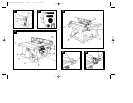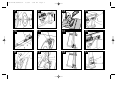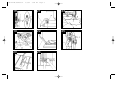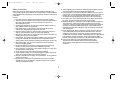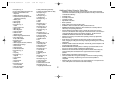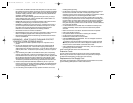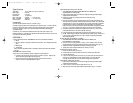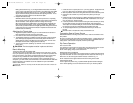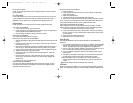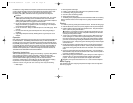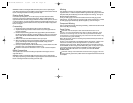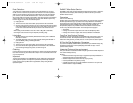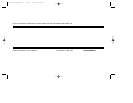
5
blade guard as shown in Fig. 11, ensuring the bolts fit into the slots on the blade
guard. The top of the slots must rest on the bolts. The bottom edge of the splitter
should be aligned with the blade (see Fig. 10). If the blade and splitter are not
aligned, remove the blade guard and reinsert it after adjusting the shims. These
shims allow for precision alignment of the blade and splitter.
4. Retighten the bolts securely.
WARNING: Before connecting the table saw to the power source or operating
the saw, always inspect the guard and splitter for proper alignment and clearance
with the saw blade. Check alignment after each change of bevel angle.
When properly aligned, the splitter will be in line with the blade at both table top
level, and at the top of the blade. Check using the straight edge. With power
disconnected, operate the blade tilt and height adjustments through the extremes
of travel and insure the guard clears the blade in all operations and that the anti-
kickback teeth are functioning.
Attaching the Throat plate
1. Align the throat plate as shown in Figure 12, and insert the tabs on the back of
the throat plate into the holes on the back of the table.
2. Press down on the front of the throat plate to snap it into place.
3. The throat plate includes four adjustment screws which raise or lower the throat
plate. When properly adjusted, the front of the throat plate should be flush or
slightly below the surface of the table top and secured in place. The rear of the
throat plate should be flush or slightly above the table top.
4. Turn the cam lock screw (Detail Fig. 12) clockwise 1/4 turn to lock the throat
plate in place.
CAUTION: The throat plate must be in place at all times.
Bench Mounting
TURN OFF AND UNPLUG TABLE SAW
The table saw must be mounted firmly. The mounting surface must have a 15” (380
mm) by 20” (508 mm) opening to allow dust to escape. Four holes are provided in the
tool’s feet for mounting. We strongly recommend that these holes be used to anchor
the table saw to your workbench or other stationary rigid frame. Alternately, to
enhance the saw’s portability, it can be mounted to a piece of wood that can be “C”
clamped to your work surface, stand or Workmate. The D
EWALT DW7440 Table Saw
Stand is designed for use with this saw, and is available from your local D
EWALT
dealer or service center.
CAUTION: Failure to securely mount the table saw to the work surface can
be hazardous.
1. Centre the saw on a square piece of 1/2” (12.7 mm) plywood. The plywood must
have a 15” (380 mm) by 20” (508 mm) opening to allow dust to escape.
2. Mark the positions of the four mounting holes in the base of the saw with a pencil.
3. Remove the saw and drill 1/4” (6.4 mm) holes in the places you have just
marked.
4. Position the saw over the four holes you drilled in the plywood and insert four 1/4”
(6.4 mm) machine screws FROM THE BOTTOM. Install washers and 1/4” (6.4
mm) nuts on the top. Tighten securely.
5. In order to prevent the screw heads from marring the surface to which you clamp
the saw, attach two strips of scrap wood to the bottom of the plywood base.
These strips can be attached with glue, or wood screws can be installed from the
top side as long as they don’t protrude through the bottom of the strip.
6. “C” clamp the plywood base to your workbench whenever you want to use
the saw.
CAUTION: Make sure table saw is firmly mounted before use.
Connecting Saw to Power Source
IMPORTANT: Before connecting saw to power source, make sure the switch is in the
OFF position.
Be sure your power supply agrees with the nameplate marking. A voltage decrease of
10 percent or more will cause a loss of power and overheating. All D
EWALT tools are
factory tested. If this tool does not operate, check the power supply.
Rip Fence Operation
RAIL LOCK LEVER
The rail lock lever locks the rip fence rails in place, preventing their movement. To lock
the rail lock lever, push it down. To unlock the lever, pull it up (see Fig. 9).
NOTE: When ripping, always lock the rail lock lever.
WORK SUPPORT EXTENSION
Your table saw is equipped with a work support extension to support work that extends
beyond the saw table. To use the work support extension, rotate it as shown in Fig. 13.
When not in use, the work support extension retracts, as shown in Fig. 14.
NOTE: Retract the work support extension whenever working over the table.
FINE ADJUST KNOB
The fine adjust knob (shown in Fig. 15) allows smaller adjustments when setting the
fence. Before adjusting, be sure the rail lock lever is in its up, or unlocked, position.
DW744-XE/387486-01 5/1/02 3:44 PM Page 13




